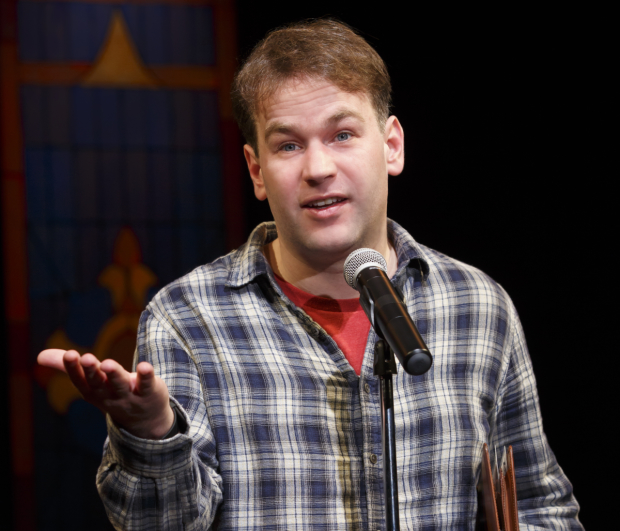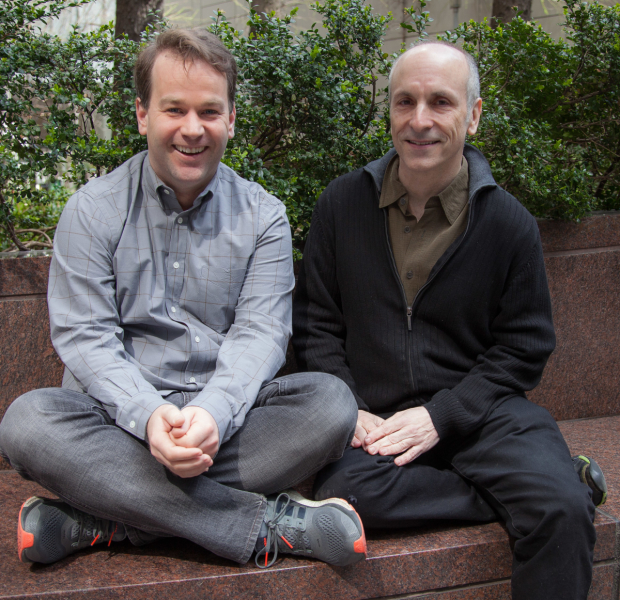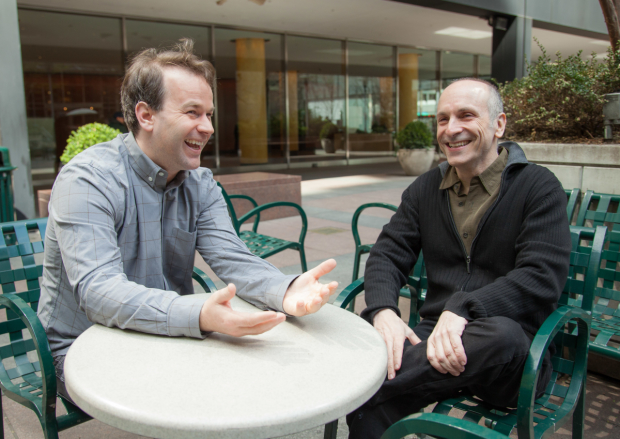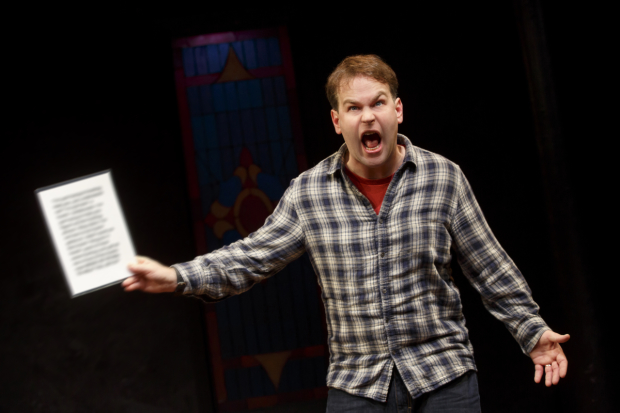Mike Birbiglia Thanks God for Jokes — and the Near-Death Experiences That Inspire Them

(© Joan Marcus)
In 2004, filmmaker David O. Russell and actress Lily Tomlin got into a vicious argument on the set of the film I Heart Huckabees. Video later surfaced of the shocking incident, in which Russell called Tomlin some of the foulest things imaginable. There was nothing funny about it, right?
Fast-forward to the 2012 Gotham Independent Film Awards. Mike Birbiglia, the writer-comedian behind Sleepwalk With Me and My Girlfriend's Boyfriend, emceed the evening, in which Russell was to be honored. How did Birbiglia fete the director? By poking fun at the Huckabees tirade, of course, and quoting it in full to the (at that point) livid filmmaker.
This event serves as the centerpiece of Thank God for Jokes, Birbiglia's latest comedy-theater hybrid at the Lynn Redgrave Theater. At first, Birbiglia wanted to go on a stand-up tour where he could simply tell jokes, without having to form a story. But director Seth Barrish saw a golden opportunity in the sudden feud with Russell, one completely in tune with the other shows they've created together, and they instantaneously seized upon it.

(© Seth Walters)
You've been working together for more than a decade now. Tell me about your collaboration process and how Thank God for Jokes came to life.
Mike Birbiglia: I would describe what we have as an open dialogue about all projects. I remember talking to Seth and being like, "After these two one-person shows [Sleepwalk With Me and My Girlfriend's Boyfriend], I'm gonna do just jokes for some time. [But then] I started thinking, there's a theme here, and Seth seized onto the David O. Russell story and said, "I think you should build backwards from [that], because it's so high-octane and extreme.
Seth Barrish: And it has stakes to it. It's interesting that in the first show, you jump out of a second-story window, and in the second show, you have a near-death car collision. It's like unless something particularly awful happens in your life—
Mike: There are no more jokes. Time to pack up, show business.
Where do you go to develop the material later seen in shows like Sleepwalk and Jokes?
Mike: We workshop at the Cherry Lane Theatre. When I'm trying to be off the radar, I just call the shows Mike Birbiglia: Working It Out, and the description is "Mike Birbiglia works out new material." It's hard, as a comedian, to put new material out and workshop it over time. Chris Rock always talks about this dilemma. He'll go to the Comedy Cellar and people will put it on the Internet, and then the comedy special comes out and they go, "Oh, I saw that." Well, not the way I wanted you to see it. You saw the seed of that concept. You didn't see the flower.
Seth: In our process, it always seems like we're looking for "the main event," the thing that everything is driving towards. It's always been mid-process when we've discovered it.
Mike: I had been working on Sleepwalk before I jumped through the window. I was writing about these sleepwalking incidents I've had in my life, and then I walked out the window and almost died. I was telling Seth and he said, "You're going to have to put that in the show." It actually pained me. When you tell people you jumped out a window, they think you're crazy. But instinctually as an artist, I'm going to have to go to the most extreme place and be the most vulnerable. I knew Seth would say that, because that's what he's always digging for: What's the thing that's most vulnerable to you, and most personal?
Seth: It's really important, when you have a collection of story-lets, that there's one thing that's driving it. Otherwise, it feels like wandering.
Mike: [Our] collaboration has been very fruitful in the sense that he comes from an extreme theater background, and I come from an extreme comedy background, and the merging of those things have made these three theater-comedies. I was drawn to Seth because I saw The Tricky Part with Martin Moran [which Barrish directed] and, to this day, is the best solo show I've ever seen. I was like, "I have to work with that director."

(© Seth Walters)
Are there any particular materials you look at when you're putting together a show of this nature?
Mike: With our first show, we studied Richard Pryor Live at the Sunset Strip. In terms of where Seth's and my universes collide, that was the best representation we had seen filmed. The Sunset Strip was particularly evocative because [Pryor] talks about freebasing cocaine and then being on fire, and for us, the sleepwalking and jumping out the window was most similar to that. In terms of talking about something that is life-threatening and making it funny, how do you do that? I venture to say that you play it real. If you watch that, [Pryor] really lives it.
There's a lot of audience interaction in Thank God for Jokes. What's the toughest encounter you've experienced during this run so far?
Mike: I goof around [in the show] about people being late. There was this guy who was an hour late. The show is an hour and a half. And I was like, "Hey, why are you an hour late?" And he was just really mean and defiant. He goes, "I heard that the first half is not as good." And I was so awestruck by it, the amount of disrespect that it would take to say that. In all my years of being a comic, I don't think I've ever had anyone be as intentionally cruel. And I've had drunks throw food at me.
So I paused and then I improvised a line I've never said before and I'll probably never say again: "If I were asked who my favorite audience member tonight would be," and I referenced people I talked to in the show earlier. "But if I were asked who my least favorite audience member [tonight] was, there would be no question." And the audience applauded. [Sometimes] not saying a joke can be the funniest thing you can do.
Do you both worry about the idea of delineating "Is this theater?" or "Is this stand-up?"
Seth: As a member of the theater community, that's one of the things that I was concerned about. I know it can get almost proprietary. We kept saying, "Let's just do what we do." The labels, to me, are just constructs anyway. If you're Joe Blow audience member, I don't think you're going, "Is this stand-up or theater?"
Mike: We want the theatergoers to come and go, "That was a great play," and stand-up comedy fans to go, "That was the best stand-up comedy I've ever seen," and people with no expectations to come and just laugh for an hour and a half and feel something. That's our mission statement. If you laugh and you feel something, than you're glad you came. That's kind of the end of the story.

(© Joan Marcus)











